From mid-June every year the Edinburgh Fringe becomes my entire personality for a couple of months and I can’t stop talking about the festival and an exciting summer ahead in Scotland. There is no place quite like Edinburgh during August and when I heard that Purple Hat Theatre’s Julia Bolden had created a piece of theatre based on her past Fringe experiences, I immediately contacted the Cambridge-based writer and performer to find out more about the show. In my experiences so far I have found that Fringe fans bond over a shared adoration of the festival and this couldn’t have been more true than my conversation with Julia. I was keen to find out how the artist was going to time travel through her past Edinburgh Fringes with the true life and new writing piece ‘A Time Traveller’s Life’. From performing her first solo show in the 1970s to working in the box office and many trips as a spectator, Julia’s festival experiences are extensive and cover so many different aspects of Fringe.
‘A Time Traveller’s Life’ is written by yourself, but your director Richard McNally has assisted with the evolution of the piece. What can you tell me about your collective process for transitioning from an initial idea to the final script that you will be presenting at Fringe?
Richard has been fantastic throughout; so patient and supportive and I always feel that I and my creative ideas are ‘safe’ with him. I initially conceived the show while at the 2022 Fringe, mused on it for six months, then, in February 2023, explored it in a series of ‘Grow Your Own Solo Show’ Workshops, led by Emma Spearing, and got helpful feedback from Emma and the other participating writers. Six months later, just before going to Edinburgh as a punter again, I took Richard out for a drink and pitched it to him. To my delight, he said a resounding ‘Yes’ straightaway. In September, we started regular Zoom meetings, to talk about how the show was going to work and for me to read aloud the latest bits I’d written. We had a first ‘on my feet’ workshop together in January which helped me to see how to make it stageable. We started actual rehearsals in April, although the script was still just a collection of random unrefined bits and pieces.
He has held my hand throughout the process of slowly building up the script and then honing it down. Often, I initially wrote a scene as narrative and then dramatised it, with the aid of his suggestions. It has continued to evolve throughout rehearsals so, literally every time we meet, I print out a whole new script, incorporating the latest rewrites and adding in his stage directions.
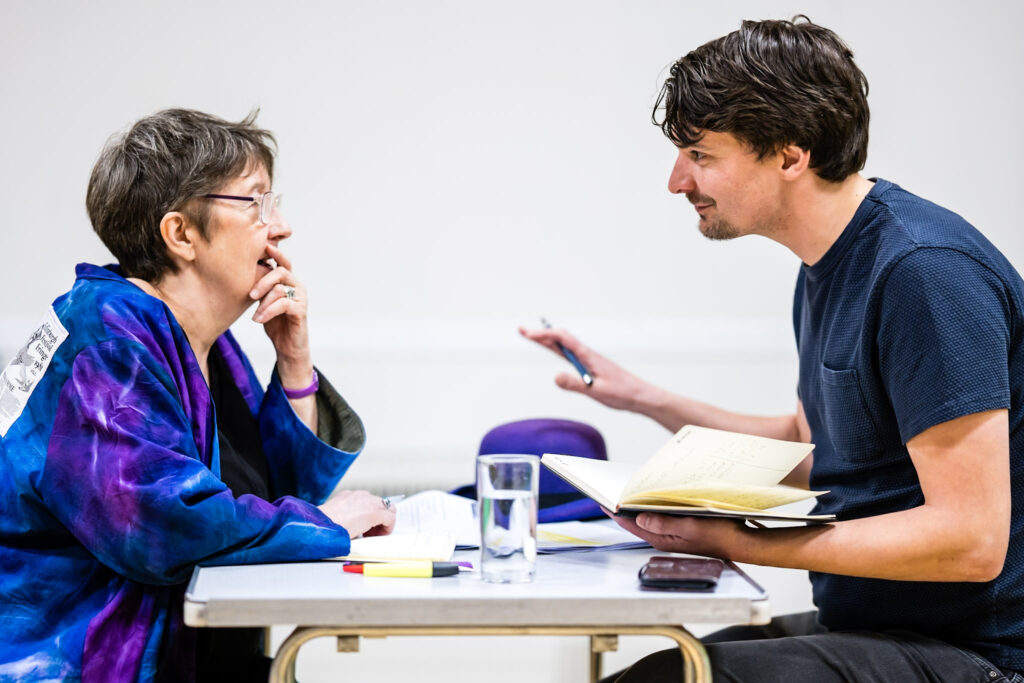
The whole process has been an emotional rollercoaster for me but I’ve enjoyed every single rehearsal, however focused or distracted, high or low I’m feeling when I walk into the room. I’ll prattle a bit and he’ll calm me down or pep me up and then we’ll get down to some serious (and fun) hard work.
My daughter asked ‘Isn’t it too intense, just the two of you in a room?’ and I said, ‘I think with anyone else it would be but I just feel so comfortable with Richard’.
You have worked together co-writing and performing various radio plays, theatrical Zoomologues during COVID, been co chairs of WRiTEON: the Cambridge-based open script writing forum and now you are working together on your new solo show. What is it about your theatre-making relationship that has inspired so many collaborations?
We think along similar lines, creatively so, when one suggests something, the other often says ‘I was thinking that’ and we spontaneously do a lot of improv-style ”yes and…’ adding to and building on each other’s ideas.
Richard’s directing style is very similar to mine; focusing not on mechanical blocking but facilitating actors finding what works and is comfortable for them and getting them to try things in different ways, to see which looks, sounds and feels best.
Although we sometimes disagree (mainly over what can and can’t be cut, in this project) we haven’t had a single actual argument, throughout this process, which is quite an achievement, as I am a very argumentative person! Sometimes, I’ll resist a change he wants to make but then, next time, I’ll say ‘I’ve realised you were right’. Other times, I’ll insist on keeping something in and later, he’ll say, ‘I really like that bit now. I’m glad we kept it.’
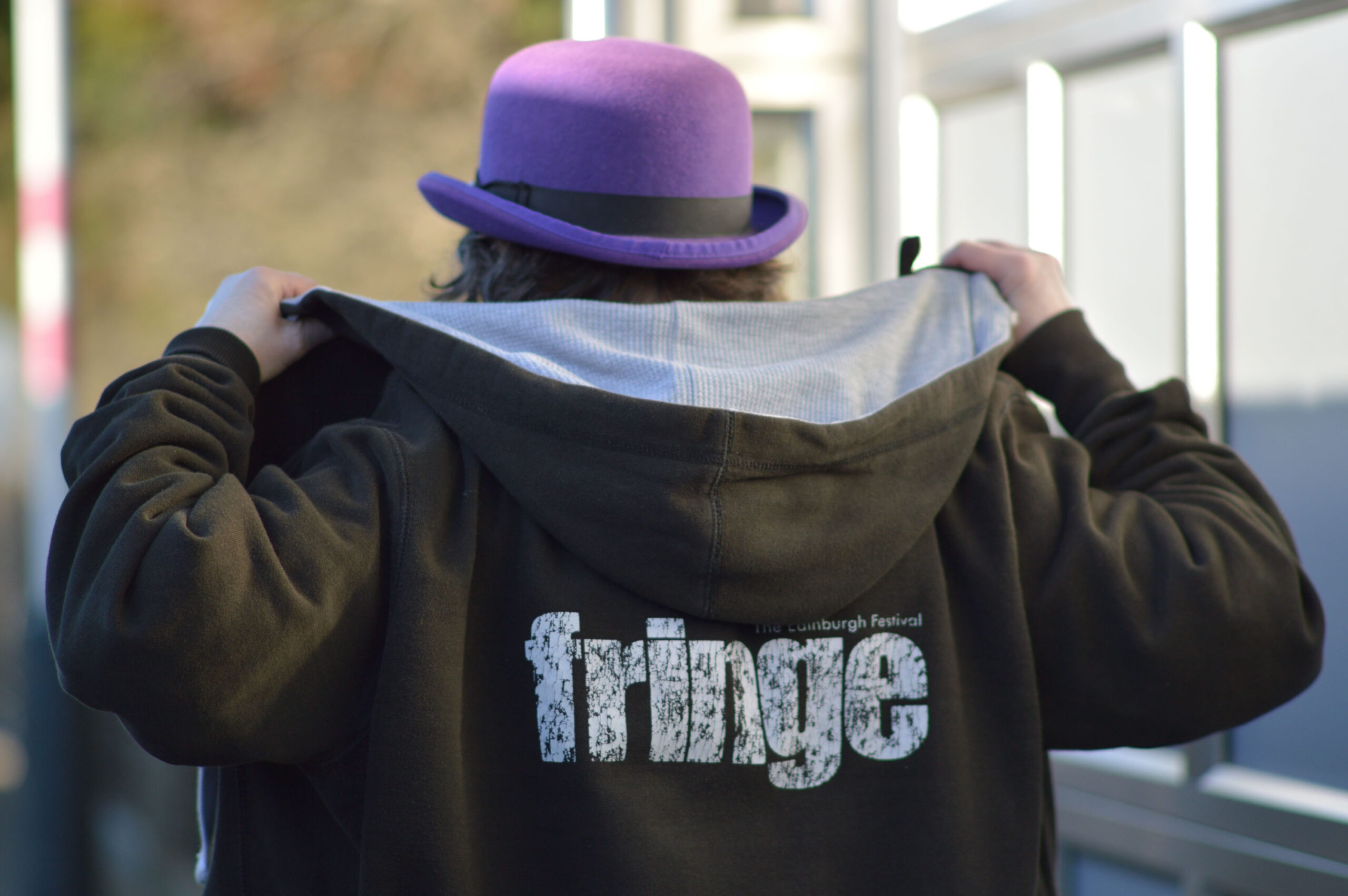
What drew you to write a play about your own experiences of the Edinburgh Fringe over the years?
I’ve often written things inspired by jobs I’ve done, relationships or encounters I’ve had and things that have happened to me but with invented characters. While participating in something called 28 Plays Later, during which you have to write a new short play each day in February, I started writing characters that were blatantly called either JULIA or just ME, mainly because, under such time-pressure, it was quicker and easier than creating new characters every day. There are a couple of local actors I’ve enjoyed seeing play me, when some of these were performed.
The idea for this play evolved while I was watching shows at the Fringe, two years ago, including a lot of solo shows, and found myself thinking ‘I want to be up there again, doing that’. I started wondering what I was interested in that I could write about to perform myself and came up with time travel. Initially, I thought it would be an invented character and made-up story. Simultaneously, I was also thinking about my past Fringe experiences and how they had ultimately led me to wanting to do a second solo show there (my first was in 1982). And then those two trains of thought converged and I realised that could be the actual time travel journey I would go on!
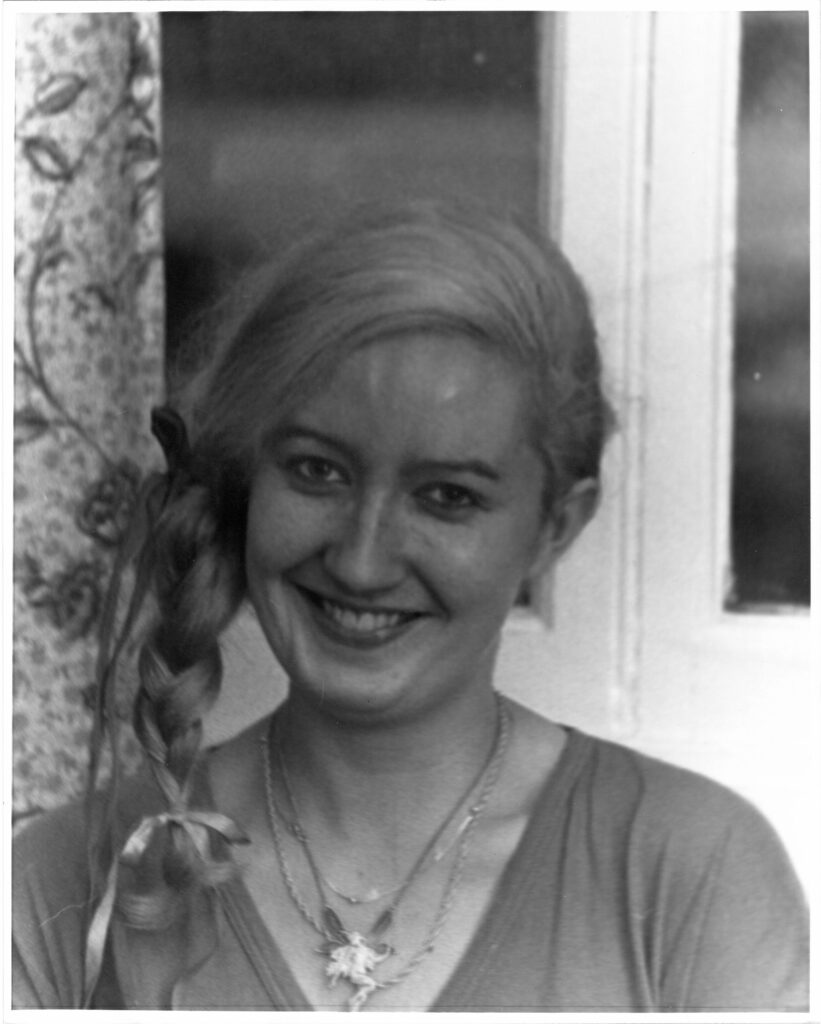
The show starts in 1979 which was actually the very first time you performed at the Edinburgh Fringe and you were “hooked from the start”. If you could give your former self one piece of advice for your first festival, what would it be and why?
Ha ha! The question of what advice I would give my younger self is actually raised in the first half of the show and not really answered until near the end, so I’m afraid I can’t say here, as that would be a spoiler!
How much of the play is inspired by real-life events?
Absolutely all of it! It’s totally based on my own personal experiences (only the names of the many other people portrayed have been removed). As I say in the show, ‘Memory can play tricks but, by travelling back in time, we see and hear what actually happened and can be sure of complete accuracy!’ 😉
To try and summarise your Fringe experiences into a 50-minute play is no easy feat. To what extent were there any memories you were disappointed to not see make the cut, when it came to finalising the script?
So many! Some of the years I time-travel back to had about 20 minutes of material, originally, but I had to cut each down to under five minutes. And there were other stories I never wrote at all because I knew there wouldn’t be room. Richard had to insist on ruthless cutting, to get it to fit the time. We mostly kept the parts that we found best fitted various emerging themes and threads, and cut the tangents.
I have a little fantasy of reworking it into a radio series and being able to put a lot of the lost material back in!
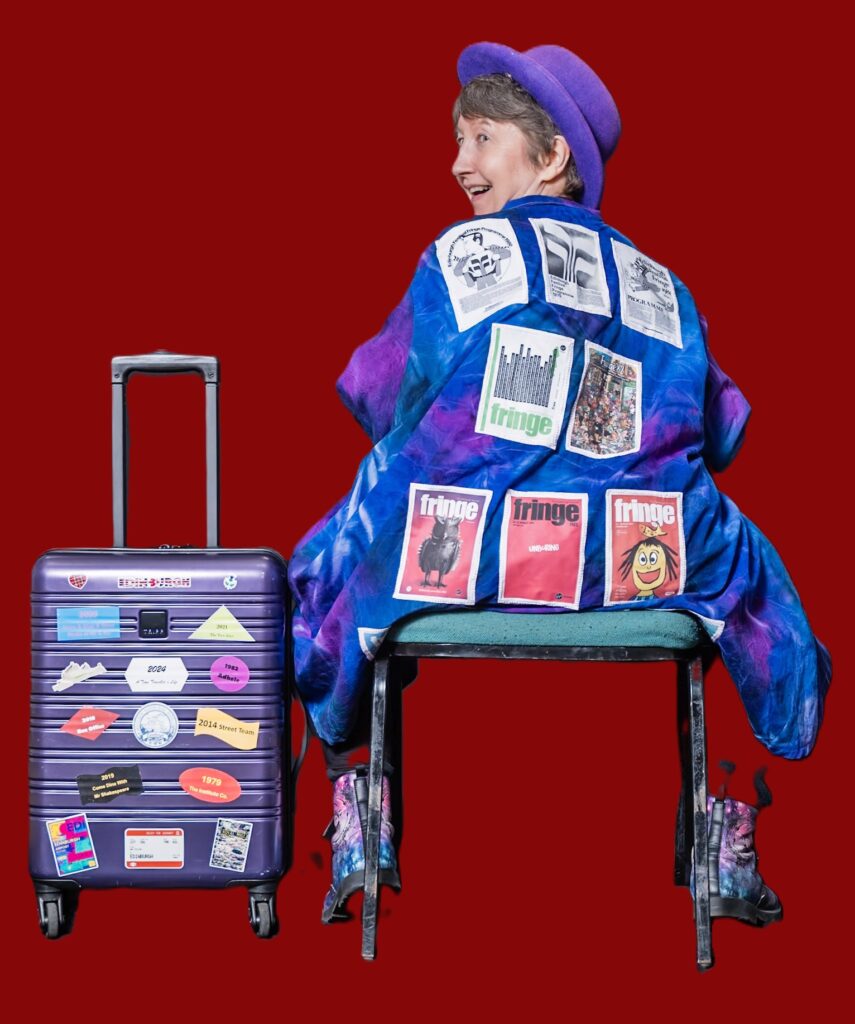
You have described the play as a “glimpse behind the scenes at EdFringe”, what do you hope audiences take away from watching ‘A Time Traveller’s Life’?
A better understanding of what it’s like to be a Fringe performer, writer, director, producer or, indeed a Fringe worker of any kind, how much energy and hard work goes into making it all happen, how exciting and exhausting it can be and that it can also be demoralising, at times. There are many stories of people who had their big breaks at EdFringe. But, alongside them, there are also thousands of us who never get beyond dreaming or who just keep quietly slogging away, or return intermittently, to give it another go.
If you could sum up the festival experience in one word, what would it be and why?
Exhilarating! I don’t think that needs any explanation except perhaps to add that it’s a word I use in the show, not to sum up the Fringe, but to describe my experience of going over the Forth Bridge on the back of a motorbike, ridden by a bloke I really fancied, in 1980.
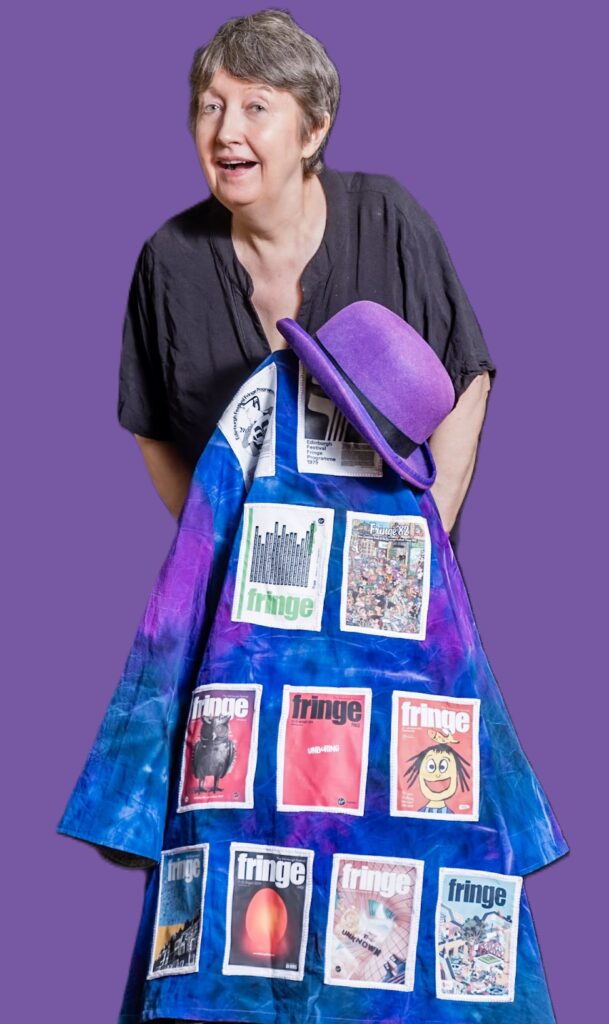
Can you recommend any Edinburgh must-sees or must-dos to anyone attending the festival for the first time this year?
Loads! Here are just a few.
Big Bite-Size Breakfast Show is an annual favourite of mine – three different morning ‘menus’ of short plays, performed by a lovely versatile regular cast. And you get a croissant, strawberry and tea/coffee to take in with you.
Kieran Hodgson is a very clever and inventive stand-up/solo theatre performer and excellent imitator, who I’ve seen develop his craft over the years.
Box Tale Soup is bringing back two of their previous shows; Gulliver’s Travels and Casting the Runes, both of which I’ve enjoyed at the Fringe in recent years, with their superb mix of live actors and puppetry.
Myra’s Story is a stunning solo show about homelessness, with one woman playing multiple roles, all equally convincingly, which I enjoyed so much at the Fringe two years ago that I hope to see it again.
I discovered Flat and the Curves, a female musical comedy cabaret troupe, for the first time last year. They are like a younger version of Fascinating Aida (who I have faithfully followed from youth to maturity). Rosé-Tinted is their new show for 2024.
Darkfield’s Flight is very scary immersive theatre, in a shipping container. They have a new show, Arcade, this year.
Plus, some friends are doing shows which I haven’t seen yet but I’m looking forward to and hoping will be amazing.
John Harper, who gets a mention in my show, as we collaborated in creating online plays and street theatre in 2021, is co-devising Clownfishing.
James Stedman, a former fellow Cambridge writer/performer, who now lives in Edinburgh, is doing his first solo EdFringe show Joyfully Grimm.
An Evening Without Kate Bush (established success) and I am Your Tribute (new) are two solo shows by Sarah-Louise Young, who also provides fabulous moral support for fellow solo performers.
Two other Cambridge-based friends are doing morning shows at the new PBH venue Hot Toddy. Annual Fringe performer Paul Richards is doing some breakfast plays and former Blue Peter presenter Liz Barker is chatting and reading her poems in Sweet Fa.
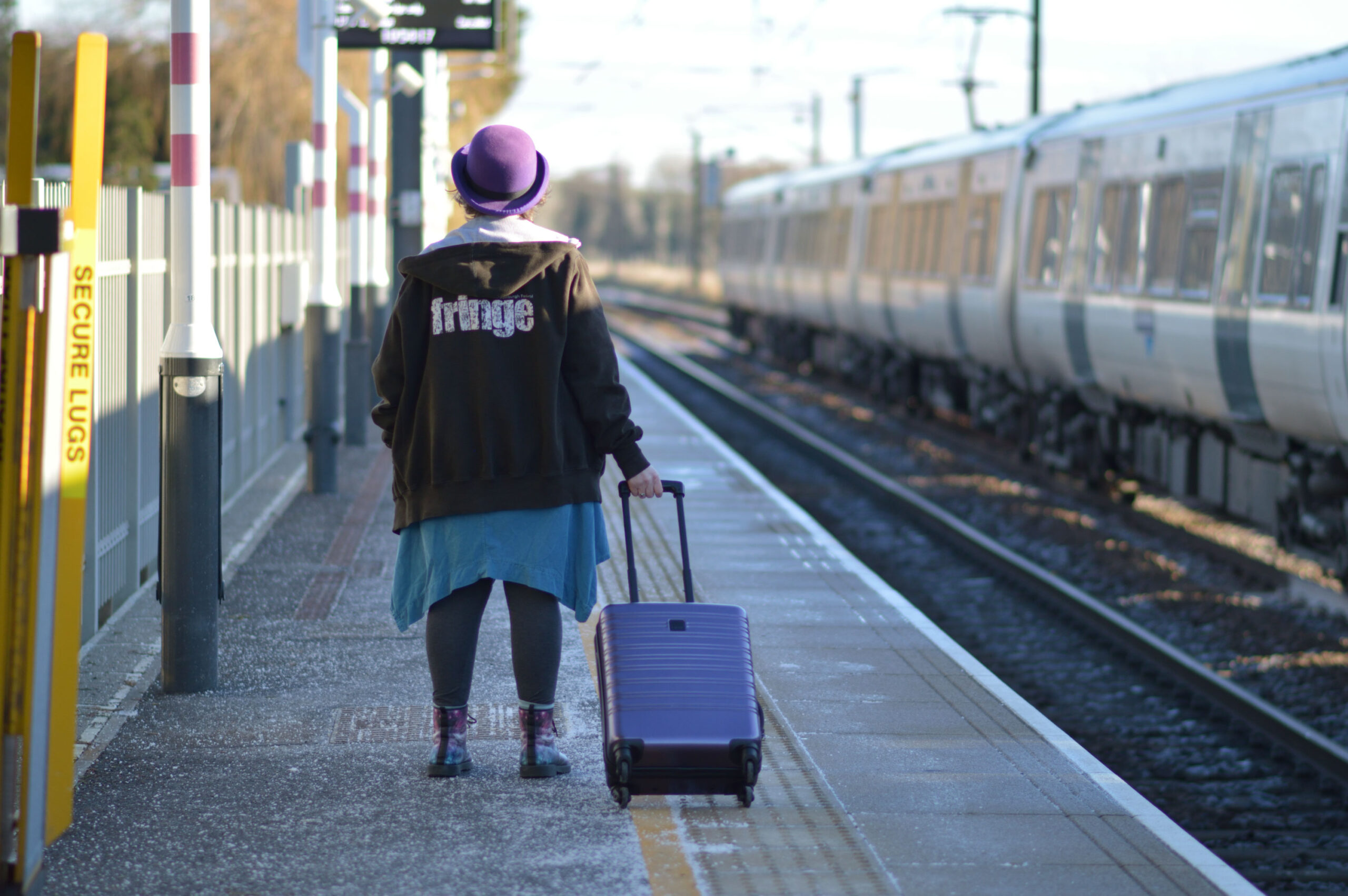
Catching Julia’s show at Fringe
There’s no denying that Julia embodies the spirit of the Fringe, in both her show’s subject matter and appreciation of fellow performers and productions. I wish both Julia and Richard all the best for the festival and hope the writer has a fabulous time taking audiences through her Fringe experiences at Greenside @ Riddles Court from 2 – 24 August (not 11th and 18th). Performances start at 12:50 daily in the Royal Mile location, with tickets available via the EdFringe website.
Thanks for reading my blog today.
Love Kat xxxx

Comments